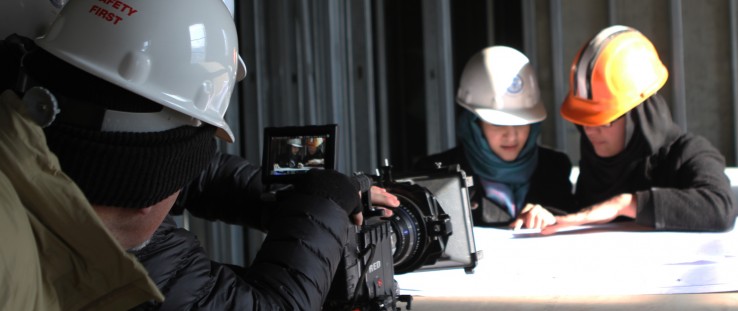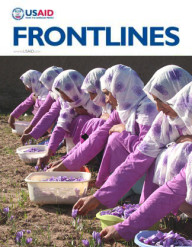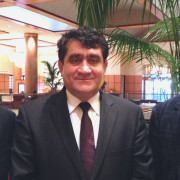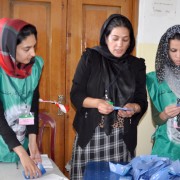 Mariam Stanekzai, whose face is obscured for security reasons, discusses a blueprint with a colleague (while also being filmed) at a construction site.
Stefan Korshak, USAID
Mariam Stanekzai, whose face is obscured for security reasons, discusses a blueprint with a colleague (while also being filmed) at a construction site.
Stefan Korshak, USAID
 Mariam Stanekzai, whose face is obscured for security reasons, discusses a blueprint with a colleague (while also being filmed) at a construction site.
Stefan Korshak, USAID
Mariam Stanekzai, whose face is obscured for security reasons, discusses a blueprint with a colleague (while also being filmed) at a construction site.
Stefan Korshak, USAID
When Mariam Stanekzai was born in 1991, Afghanistan was still reeling from the Soviet occupation and a civil war was just beginning. Later, while she was growing up under Taliban rule, women were banned from work and girls had to study in secret.
Fast forward to the modern day and you’ll find Stanekzai heading to her office each morning at the Afghan national power utility, Da Afghanistan Breshna Sherkat (DABS), where she works as an engineer as part of a USAID program to provide quality assurance and logistical support for U.S.-funded infrastructure projects. Stanekzai’s job is part of the $75 million Kajaki Unit 2 Installation Project, one element of USAID’s efforts to help Afghanistan improve its energy infrastructure. Stanekzai began working at DABS after receiving hands-on training as an intern with another USAID engineering support program that provides architectural and technical engineering services to Afghanistan’s public infrastructure sector.
FrontLines: Why did you decide to become an engineer?
Mariam Stanekzai: It started back in my school days—I always was more interested in math and science. I was born and raised in Kabul and I saw how the city was destroyed. In those days, I would look at old pictures of Kabul, from before the war, and compare them with the current situation at that time. I thought, ‘How can I contribute to build these things? What is the way? How can I rebuild these buildings?’ Then it was very clear for me. I knew that this was what I wanted to do. This was the path I wanted to take.
FrontLines: How old were you when you knew you wanted to become an engineer?
Stanekzai: I was in seventh or eighth grade, and we were studying in a tent—our classroom was in a tent. They were constructing a building for our school, and I was very excited about moving into the new classrooms and interested in how engineering could help. It was simply a childhood dream in the beginning, but as time passed, I saw I could be serious about building and construction.
FrontLines: Engineering is not a common profession for Afghan women. Did your family support your decision to pursue engineering? Did you meet anyone who opposed the idea?
Stanekzai: It is a very unique profession. It was pretty strange. In the beginning, I thought, ‘Why aren’t there women studying or working in the engineering field?’ There was no logical reason for women not to be here, for me not to be here. So I thought: ‘Why not? Why shouldn’t I be an engineer? Why shouldn’t I become one of the first female engineers for my country?’
I am fortunate because my family is very educated. My father is a university professor. My mother is a psychologist. They’ve pretty much supported me the whole time, but my mom worries about me. She asks me sometimes, ‘How will you manage your family and work life in such a traditional society?’ It’s really uncommon for women to be engineers in Afghanistan, but she never tried to stop me and always tried to motivate and encourage me to be strong, especially when facing the many people who disagree with me pursuing a career in engineering.
FrontLines: What would you say are the most important things you learned during your education as an engineer? What do you think are the most important things for an engineer in Afghanistan to understand?
Stanekzai: Aside from the technical knowledge, an engineer in Afghanistan must understand the needs and priorities of our society since we’re currently in a critical situation. I’m a civil engineer—we focus most of our efforts on society’s needs and how engineering can help meet those needs. From an engineering perspective, much of the infrastructure in Afghanistan requires major rehabilitation. With few exceptions, there are no proper water supply systems and no modern wastewater systems. Everything was built ad hoc, for the short term. The systems are not connected—almost always they are for a very specific area. The focus has been on the cities.
Even now, rural populations are still living with really basic levels of infrastructure. Many people still have no access to electricity or potable water. By modern standards, most Afghans still live in places unfit and unsafe for habitation. Buildings are not properly insulated for the winter or for the summer. Each Afghan family is responsible for obtaining their own clean water and electricity. This is not sustainable. My dream is that I will help build a sustainable infrastructure in my country and create a foundation for a stable place to live. That’s what Afghanistan needs, not short-term fixes.
FrontLines: If it was up to you, what would you build first in Afghanistan?
Stanekzai: What I want to see in the future here is for every family at each level of society—not just the high-class families, but the immigrants, the families that lost their homes—everyone should be able to live decently. Everyone should have access to clean water, a safe place to live, a home that is a proper place to bring up a family. I want all those families to have a good standard of living, electricity, a clean and peaceful environment, and for Afghans to have access to all of the facilities people have in developed countries. I want to be part of the work to make this goal a reality in my country.












Comment
Make a general inquiry or suggest an improvement.